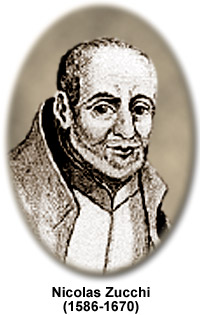Nicolas Zucchi
(1586-1670)

Nicolas Zucchi was born in Parma, Italy on December 6, 1586 to an aristocratic family. One of eight children, he was raised to join the Church and studied rhetoric in Piacenza and theology in Parma at Jesuit colleges. He entered the Jesuit order in 1602 and remained in the order throughout his entire life. The early years of his career were spent teaching mathematics, rhetoric, and theology at Jesuit colleges in Rome and Ravenna. Later he served as the apostolic preacher, a dignitary office instated in 1555 that is often commonly referred to as “preacher to the pope.” He also was an official of the Jesuit house in Rome and appears to have received patronage from a number of different individuals, to some of whom he dedicated various scientific works.
Zucchi’s interest in astronomy was reportedly encouraged by Johannes Kepler, whom he met when he visited the court of Emperor Ferdinand II as part of a retinue on an emissary mission of the pope. The pair maintained correspondence with one another after Zucchi returned to Rome. However, Zucchi was apparently intrigued by astronomy long before he met Kepler, having designed one of, if not the, earliest reflecting telescope in 1616. Though the practicality of the primitive instrument was poor (his design did not provide a way to keep the head of the user from intercepting most of the rays which are needed to form the focal image), by many accounts he was able to use his reflecting telescope to discover the belts of Jupiter in 1630 and examine the spots on the planet Mars ten years later. Also, at the urging of the Jesuit scientist Paul Guldin, Zucchi bestowed a reflecting telescope of his design to Kepler, who received it with such satisfaction that the dedication of his final book was to Guldin.
Zucchi described his reflecting telescope and his invention of it in the treatise Optica philosophia experimentalis et ratione a fundamentis constituta, which was published in the 1650s. The landmark work reportedly influenced James Gregory and Sir Isaac Newton, both of whom built improved reflecting telescopes in the 1660s. In addition to a discussion of the telescope, Zucchi’s treatise included a description of his work with phosphors, from which he correctly concluded that such substances do not store light, but rather produce it. His interest in science surpassed just optical concerns, however, and he published two separate works on mechanics and machines before he died on May 21, 1670.
